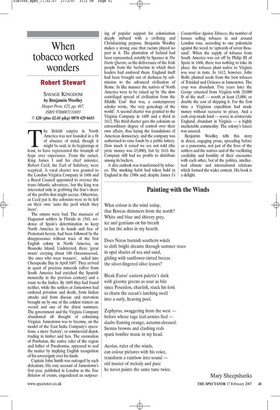When tobacco worked wonders
Robert Stewart SAVAGE KINGDOM by Benjamin Woolley Haiper Press, £25, pp. 467, ISBN 9780007131693 © £20 (plus £2.45 p&p) 0870 429 6655 The British empire in North America was not founded in a fit of absence of mind, though it might be said, in its beginnings at least, to have represented the triumph of hope over experience. From the outset, King James I and his chief minister, Robert Cecil, the Earl of Salisbury, were sceptical. A royal charter was granted to the London Virginia Company in 1606 and a Royal Council appointed to oversee the trans-Atlantic adventure, but the king was interested only in grabbing the lion's share of the profits that might accrue. Otherwise, as Cecil put it, the colonists were to be left on their own 'unto the peril which they incur'.
The omens were bad. The massacre of Huguenot settlers in Florida in 1565, evidence of Spain's determination to keep North America in its hands and free of Protestant heresy, had been followed by the disappearance without trace of the first English colony in North America, on Roanoke Island. Undeterred, three 'great swans' carrying about 100 Otasantasuwalc `the ones who wear trousers', sailed into Chesapeake Bay in April 1607. They arrived in quest of precious minerals (silver from South America had enriched the Spanish monarchy in the previous century) and a route to the Indies. By 1609 they had found neither, while the settlers at Jamestown had endured privation and death, from Indian attacks and from disease and starvation brought on by one of the coldest winters on record and one of the driest summers. The government and the Virginia Company abandoned all thought of colonising Virginia. Jamestown was to become, on the model of the East India Company's operations, a mere `factory', or commercial depot, trading in timber and furs. The coronation of Powhatan, the native ruler of the region and father of Pocahontas, appeared to seal the matter by implying English recognition of his sovereignty over his lands.
Captain John Smith was outraged by such defeatism. His rosy account of Jamestown's first year, published in London as the True Relation of events, engendered an outpouring of popular support for colonisation deeply imbued with a civilising and Christianising purpose. Benjamin Woolley makes a strong case that racism played no part in it. The plantation of Ireland had been represented, notably by Spenser in The Faerie Queene, as the deliverance of the Irish people from the barbarism in which their leaders had enslaved them. England itself had been brought out of darkness by submission to the advanced civilisation of Rome. In like manner the natives of North America were to be raised up by `the slow centrifugal spread of civilisation from the Middle East' that was, a contemporary scholar wrote, `the very genealogy of the world'. A second charter was granted to the Virginia Company in 1609 and a third in 1612. The third charter gave the colonists an extraordinary degree of control over their own affairs, thus laying the foundations of American democracy, and the company was authorised to raise funds by a public lottery. How much it raised we are not told (the prize money was £5,000), but by 1616 the Company still had no profits to distribute among its backers.
A dire outlook was transformed by tobacco. The smoking habit had taken hold in England in the 1580s and, despite James I's Counterblast Against Tobacco, the number of houses selling tobacco in and around London rose, according to one polemicist against the weed, to 'upwards of seven thousand'. When the supply of tobacco from South America was cut off by Philip III of Spain in 1606, there was nothing to take its place: the tobacco plant native to Virginia was sour in taste. In 1612, however, John Rolfe planted seeds from the best tobacco of Trinidad and Orinoco at Jamestown. The crop was abundant. Five years later the George returned from Virginia with 20,000 lb of the stuff — worth at least £5,000, or double the cost of shipping it. For the first time a Virginian expedition had made money without recourse to piracy. And a cash crop made land — scarce in aristocratic England, abundant in Virginia — a highly marketable commodity. The colony's future was assured.
Benjamin Woolley tells this story in direct, engaging prose, spreading before us a panorama, not just of the lives of the settlers and the natives and of the vacillating cordiality and hostility of their encounter with each other, but of the politics, intellectual climate and international relations which formed the wider context. His book is a delight.

























































 Previous page
Previous page